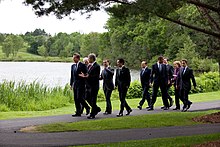G8 summit in Huntsville 2010
| 36th G8 summit | ||
|---|---|---|
| place |
|
|
| Beginning | June 25, 2010 | |
| The End | June 26, 2010 | |
| Participants from the G8 group | ||
|
|
Stephen Harper | |
|
|
Nicolas Sarkozy | |
|
|
Angela Merkel | |
|
|
Silvio Berlusconi | |
|
|
Naoto Kan | |
|
|
Dmitry Medvedev | |
|
|
David Cameron | |
|
|
Barack Obama | |
| Participants from the G5 group | ||
|
|
Luiz Inácio Lula da Silva | |
|
|
Hu Jintao | |
|
|
Manmohan Singh | |
|
|
Felipe Calderón | |
|
|
Jacob Zuma | |
| Representatives of international organizations | ||
|
|
José Manuel Barroso | |
|
|
Muammar al-Gaddafi | |
|
|
Nursultan Nazarbayev | |
|
|
Yukiya Amano | |
|
|
Kōichirō Matsuura | |
|
|
Ban Ki-moon | |
|
|
Margaret Chan | |
| ← 2009 | → 2011 | |
The 2010 G8 summit in Huntsville was the 36th summit of the Group of Eight leaders . The meeting took place under the Canadian Presidency of Prime Minister Stephen Harper on June 25 and 26, 2010 at the Deerhurst Resort in Huntsville , a parish in the Muskoka District Municipality in Ontario , Canada . One day later, the G20 summit took place in Toronto .
It was the fifth G8 summit in Canada since 1976. The locations of previous events in Canada were: Montebello, Quebec (1981); Toronto, Ontario (1988); Halifax, Nova Scotia (1995); and Kananaskis, Alberta (2002).
The G8 participants traveled to North Bay / Jack Garland Airport in North Bay , Ontario.

subjects
Economic policy
An important topic of the summit was the further global economic development. In this context, there were differences of opinion between US President Barack Obama and German Chancellor Angela Merkel on the question of how future economic growth should be promoted. While US President Obama spoke out in favor of continuing to support the global economy with new debt, Merkel advocated austerity measures to consolidate the budget. The Chancellor named "intelligent saving and growth" as the goal. At the same time, she emphasized the willingness of the EU states to undertake structural reforms in order to overcome the crisis. The feared open conflict between the USA and Europe on the issue of budget consolidation did not materialize, however, because all G8 countries confirmed the need to reduce deficits in principle. The G8 heads of state and government were unable to agree on the schedule. A bank levy and financial transaction tax previously demanded by Merkel had already failed in the run-up to the summit due to opposition from some countries, including Canada and Russia . Merkel and Obama had jointly called for the financial sector to share in the costs of the crisis. The chambers of industry and commerce in the 20 largest industrial nations also issued a statement against the introduction of a financial transaction tax and bank levy.
Foreign policy
Important foreign policy issues included the sinking of the South Korean corvette Cheonan by North Korea and the Iranian nuclear program . The attack by North Korea on the South Korean ship with 46 dead, which had previously been confirmed by an international commission of inquiry, was condemned by all G8 heads of state and government. In a joint statement, the politicians called on North Korea to abstain from "any attacks or hostile threats" against its neighbor South Korea. US President Obama said that North Korea's irresponsible actions must have consequences. At the summit, the G8 heads of state and government expressed their concerns about nuclear proliferation , citing Iran and North Korea as the greatest threats. They called on all states to implement the UN sanctions against Iran.
Development policy
To reduce maternal and child mortality worldwide , the G8 countries agreed on an aid package worth 5 billion dollars. Merkel from Germany promised a contribution of $ 500 million for this so-called Muskoka initiative. Commitments of a further 2.3 billion were made by private organizations and other states. International aid organizations called the pledges insufficient and criticized individual G8 states for not keeping aid pledges from past summits.
Web links
Individual evidence
- ↑ Obama's debt strategy angered Europe. G-8 summit in Canada. spiegel.de, June 26, 2010, accessed on August 12, 2015 .
- ↑ USA and Europe agree on deficit reduction. handelsblatt.com, June 25, 2010, accessed August 12, 2015 .
- ↑ a b "Negative clarity" of the G20: Merkel writes off global bank levy. n-tv.de, June 26, 2010, accessed on August 21, 2015 .
- ^ G8 summit: Politics as a lifeline. focus.de, June 26, 2010, accessed on August 12, 2015 .
- ↑ Obama supports Merkel with bank levy. G8 and G20 summits in Canada. stern.de, June 26, 2010, accessed on August 13, 2015 .
- ^ Obama, G8 leaders boost pressure on North Korea, Iran. reuters.com, June 26, 2010, accessed August 13, 2015 .
- ↑ Merkel writes off global financial transaction tax. Chancellor praises G8 summit. rp-online.de, June 26, 2010, accessed on August 26, 2015 .
- ↑ Fight Debt. The main results of the G8 and G20 double summits in Canada. berliner-zeitung.de, June 28, 2010, accessed on August 26, 2015 .
- ^ "Negative clarity" of the G20: Merkel writes off global bank levy. n-tv.de, June 26, 2010, accessed on August 26, 2015 .
